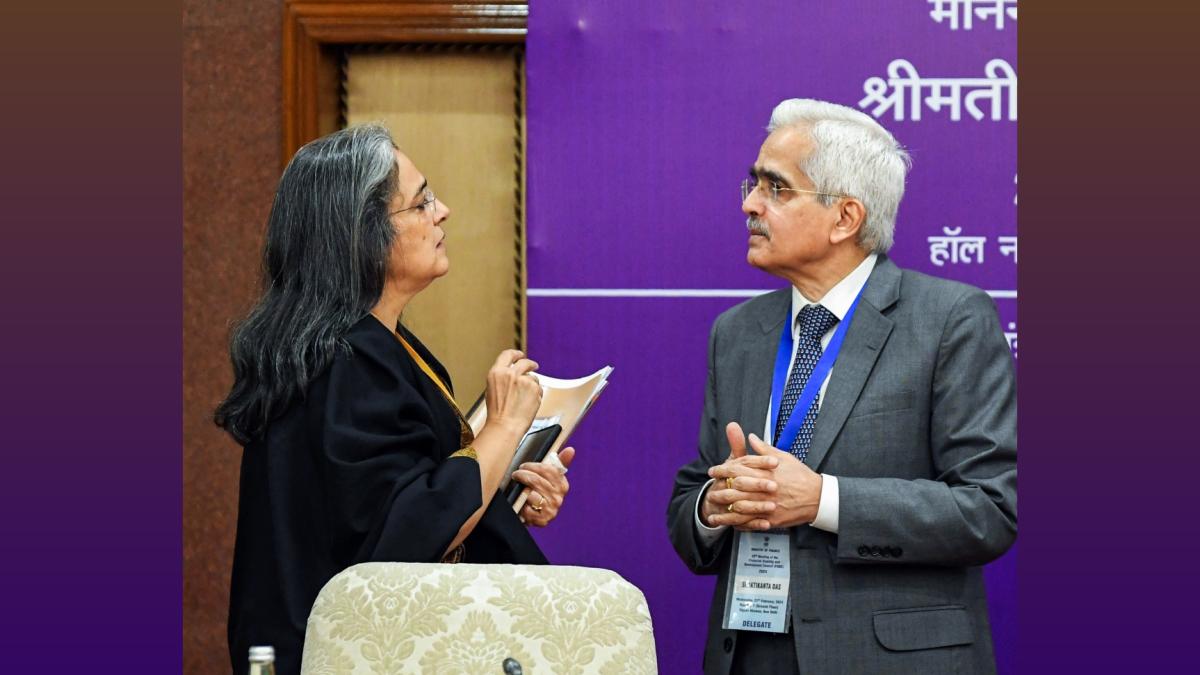SEBI to Introduce Same-Day Settlement by March 2024
SEBI chief Madhabi Puri Buch announced plans to introduce same-day settlement (T+0) of trades on stock exchanges by March 2024, aiming for greater efficiency and reduced risk in the market.

All photographs: ANI Photo
New Delhi, Dec 8 (PTI) Sebi chief Madhabi Puri Buch on Friday said the capital markets regulator is ready to introduce same-day settlement of trades on the stock exchanges by March 2024.
Speaking at the Global Economic Policy Forum 2023 organised by the Confederation of Indian Industry (CII), Buch said, "We are ready to introduce T+0 (T plus zero) settlement trade by the end of the current fiscal".
The regulator, which has already reduced the settlement timelines to as short as one day after the transaction, is now looking to shorten the same further.
The Sebi chief talked about the T+1 regime that has been implemented in the market. Earlier this year, the country's stock markets transitioned from T+2 to T+1 settlement, settling trades on the following business day.
"It takes two things to make this happen. First is technology and second is co-creation. We are now moving to T+0 which will happen before the end of this financial year and one year from there we will have instantaneous settlement, which is optional. When we do this, risk in the system comes down," Buch said here.
"The two reasons why we have been able to bring T+1 to the people are stellar technology - the technology and market stack in India are unparalleled and have been acknowledged as one of the best in the world. Second being the co-creation with the institution and creating a methodology of regulations with them," she said.
Addressing the session on 'Building Resilient Capital Markets: Strategies and Way Forward', she said that trust is the first element of market foundation and risk management is important for building this trust.
According to her, it is very crucial to earn the trust of investors in the market and risk mitigation through technology has facilitated in building that trust.
"Up until now we had the potential, but we did not have the tools to manifest that potential. Today with technology, we have the tool to manifest this potential and take it to the farthest corner of our country. Technology enables us to make businesses viable," Buch said.
"Our belief is markets need to have a strong foundation. The deeper the foundation, the taller the superstructure can be. The role of the regulator is to create that depth and foundation. The first element of this foundation is trust," she emphasised.
Further, she said it is important to build this trust whether "it is the trust of the individual investor, retail investor, foreign investor, anybody who is giving the capital to grow. Without that trust, there can be no business. It is our responsibility to co-create that trust. To build this trust, risk management has to be strong. We have created huge risk mitigation measures in the market."
Buch emphasised that transparency and disclosure are critical for the listed companies.
"Being transparent in the IPO document or subsequent documents protects companies. The beauty of transparency is it helps companies and investors," she added.
The country has seen a significant increase in the number of individual investors accessing the capital market, apparent in the significant rise in the number of Demat accounts.
"What was achieved in the last two decades has been achieved in the last two-and-a-half years. It was achieved on the back of significant adoption of technology by market intermediaries and market infrastructure in institutions," she said.
Speaking at the Global Economic Policy Forum 2023 organised by the Confederation of Indian Industry (CII), Buch said, "We are ready to introduce T+0 (T plus zero) settlement trade by the end of the current fiscal".
The regulator, which has already reduced the settlement timelines to as short as one day after the transaction, is now looking to shorten the same further.
The Sebi chief talked about the T+1 regime that has been implemented in the market. Earlier this year, the country's stock markets transitioned from T+2 to T+1 settlement, settling trades on the following business day.
"It takes two things to make this happen. First is technology and second is co-creation. We are now moving to T+0 which will happen before the end of this financial year and one year from there we will have instantaneous settlement, which is optional. When we do this, risk in the system comes down," Buch said here.
"The two reasons why we have been able to bring T+1 to the people are stellar technology - the technology and market stack in India are unparalleled and have been acknowledged as one of the best in the world. Second being the co-creation with the institution and creating a methodology of regulations with them," she said.
Addressing the session on 'Building Resilient Capital Markets: Strategies and Way Forward', she said that trust is the first element of market foundation and risk management is important for building this trust.
According to her, it is very crucial to earn the trust of investors in the market and risk mitigation through technology has facilitated in building that trust.
"Up until now we had the potential, but we did not have the tools to manifest that potential. Today with technology, we have the tool to manifest this potential and take it to the farthest corner of our country. Technology enables us to make businesses viable," Buch said.
"Our belief is markets need to have a strong foundation. The deeper the foundation, the taller the superstructure can be. The role of the regulator is to create that depth and foundation. The first element of this foundation is trust," she emphasised.
Further, she said it is important to build this trust whether "it is the trust of the individual investor, retail investor, foreign investor, anybody who is giving the capital to grow. Without that trust, there can be no business. It is our responsibility to co-create that trust. To build this trust, risk management has to be strong. We have created huge risk mitigation measures in the market."
Buch emphasised that transparency and disclosure are critical for the listed companies.
"Being transparent in the IPO document or subsequent documents protects companies. The beauty of transparency is it helps companies and investors," she added.
The country has seen a significant increase in the number of individual investors accessing the capital market, apparent in the significant rise in the number of Demat accounts.
"What was achieved in the last two decades has been achieved in the last two-and-a-half years. It was achieved on the back of significant adoption of technology by market intermediaries and market infrastructure in institutions," she said.
You May Like To Read
TODAY'S MOST TRADED COMPANIES
- Company Name
- Price
- Volume
- Vodafone-Idea-L
- 11.65 (+ 3.56)
- 106772451
- Alstone-Textiles
- 0.28 ( -3.45)
- 44187760
- Mangalam-Industrial
- 0.88 ( -2.22)
- 39177573
- Sunshine-Capital
- 0.27 (+ 3.85)
- 35956340
- GMR-Airports
- 104.40 (+ 6.37)
- 30453005





